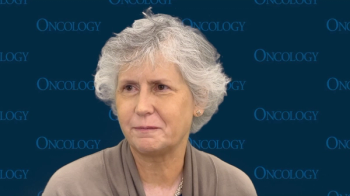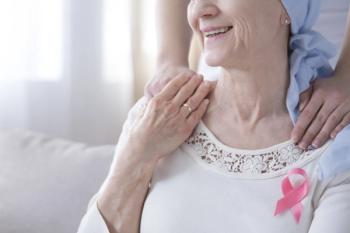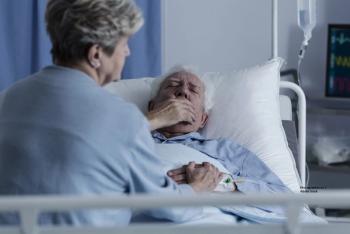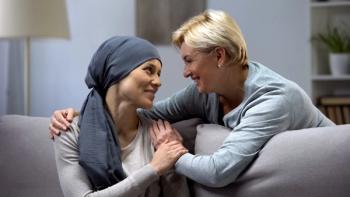
“Food is powerful, and [patients] need fuel,” said Claudia Aguilar Clancy, RN, FNP-C, about ensuring patients receive the nutrition they require during cancer treatment.

Your AI-Trained Oncology Knowledge Connection!


“Food is powerful, and [patients] need fuel,” said Claudia Aguilar Clancy, RN, FNP-C, about ensuring patients receive the nutrition they require during cancer treatment.

Suzanne Mahon, DNS, RN, AOCN, AGN-BC, FAAN, stated that it is important to consider a patient’s family medical history when considering genetic counseling.

Multidisciplinary education on toxicities such as CRS and ICANS improves the safety and management of bispecific T-cell engager therapies in outpatient settings.

Post hoc analysis of the NAPOLI 3 trial suggests that proactively managing NALIRIFOX-induced diarrhea could allow patients with PDAC to remain on treatment longer.

Race, education, and arm pain were found to influence acupuncture expectancy in patients who are survivors of breast cancer.

Identifying biologic mechanisms driving symptoms may be necessary to develop therapies that reduce symptom burden for patients with breast cancer.

An objective assessment tool like the ICE Score may standardize grading of neurotoxicity associated with newer bispecific antibodies in hematologic cancer.

The Integrated Palliative Care Outcome Scale showed the potential to guide palliative care integration to better help patients and clinicians after AHSCT.

A total of 32% of registered nurses and 29% of infusion nurses reported that educating patients regarding their diseases was challenging.

The study found that older females with central nervous system tumors had significantly lower vigorous physical activity participation vs their counterparts.

Registered nurses discuss research related to agents like ciltacabtagene autoleucel presented at the 2024 Oncology Nursing Society Congress.

Collaboration among nurses, social workers, and others may help in safely administering outpatient bispecific T-cell engager therapy to patients.

Nurses should be educated on cranial nerve impairment that may affect those with multiple myeloma who receive cilta-cel, says Leslie Bennett, MSN, RN.

Treatment with cilta-cel may give patients with multiple myeloma “more time,” according to Ishmael Applewhite, BSN, RN-BC, OCN.

Nurses may need to help patients with multiple myeloma adjust to walking differently in the event of peripheral neuropathy following cilta-cel.

Nurses must increase the frequency of their assessments for early intervention of patients who undergo treatment for their head and neck cancer, in an effort to truly individualized care.

A mobile app may help to expedite treatment and identification for patients with GVHD.

Additional research may be necessary to validate the efficacy of telehealth interventions in clinical activities for patients with cancer.

Lack of energy, difficulty with sleeping, and pain were some of the most common symptoms reported in older patients with cancer.

One of the most important roles of a nurse coordinator is transmitting patient and caregiver information during the CAR T-cell treatment process.

A verbal tocilizumab workflow helped provide safer and more effective delivery of the agent for patients experiencing cytokine release syndrome.

Loncastuximab tesirine and rituximab led to encouraging responses in most patients with relapsed/refractory follicular lymphoma in a single-center study.

Findings from the CARTITUDE-2 trial support the use of cilta-cel in patients with multiple myeloma, says Tina Glow, AAS, RN, BSN.

The latest CARTITUDE-4 data examine the efficacy and safety of ciltacabtagene autoleucel in lenalidomide-refractory multiple myeloma.

Patients enrolled across the CARTITUDE trials who experienced cranial nerve palsy after treatment with cilta-cel were generally male.

A presentation at the recent 46th Annual Oncology Nursing Society’s Annual Meeting focused on ethical dilemmas facing oncology nurses and how clinicians are managing them.

In patients with gastrointestinal cancers, factors such as younger age and comorbidities, among others, were significantly associated with a greater likelihood of sleep disturbance.

Nurse Navigator Janeen Bazan, RN, OCN, BSN, talks about the 4R Care Sequence® and its impact on the care of patients with breast cancer at the 2021 Oncology Nursing Society Annual Congress.

Better adherence to oral chemotherapy was seen in patients who used a smartphone mobile app, according to a presentation at the Oncology Nursing Society’s 46th Annual Congress.

Specific resources needed for survivors of cancer to effectively cope during the first year after treatment were limited due to the COVID-19 pandemic, causing survivors to self-cope with known mechanisms.